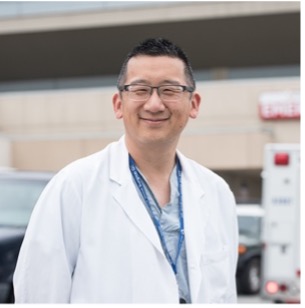
Dr John Hwang set out to spread his quality improvement work by establishing complex wound care clinics across the Fraser Health region through SSC’s Spreading Quality Improvement Initiative.
His plan didn’t go quite as envisioned. Instead, he innovated to land on a different, more effective and cost-efficient approach – and new pathway for complex wound care that has much broader, positive potential.
Getting at-risk patients to specialist care faster
A general surgeon and physician lead for Fraser Health’s regional complex wound clinic, Dr Hwang’s original PQI project in 2017-18 focused on the concept of ‘time is tissue.’ It involved working with home health nurses to identify and expedite referrals of high-risk wound care patients to team-based, multidisciplinary care at the clinic.
“We found that early identification and treatment of patients at high risk for wound chronicity and complications, followed by early referral to and treatment at a specialized wound clinic, resulted in faster healing and reduced health system costs,” he said.
For patients, this meant potentially less suffering and pain and better outcomes.
His analysis of 20 chronic wound patients found a:
53.6% reduction in average referral times to the clinic
59.6% reduction in average healing times
66.0% reduction in the average number of home care visits required for healing
Potential for significant cost avoidance (87.7%) compared with delayed treatment outside the clinic.
Spreading the results
Dr Hwang was eager to extend the results to a much broader population in the region. Knowing that the geographic location of the wound clinic in Port Moody would limit impact and spread, he set out to duplicate complex wound care clinics in Fraser east and south.
He soon discovered that trying same thing in different setting would not be a solution: funding for new clinics was just not available in the system. He began to think differently.
“Maybe I can go to the home health offices instead and try to replicate what we do at the complex wound clinic in their environment,” he reflected. “By having a physician available for diagnoses and medical orders, why couldn’t they do what we are doing and get the same results?”
He noted an example of the condition of stasis, where compression stockings are central to treatment and a clinical best practice. Yet they were not being used by patients on a consistent basis in the community because of the need for a physician order. Having access to a physician to open that door was important.
He started working with the Abbotsford and Surrey Home Health offices where he knew the wound care nurses well. But what should have been an easy transition didn’t pan out.
“I’d go to these clinics, but they didn’t know what to do with me,” he said. “We couldn’t get things done and did not have much impact.”
It was clear that simply having a doctor present was not enough. Systematic and process issues were getting in the way.
He thought, “Is there a better way of using the physician resource to work with nursing leads at the home health office, within a more prescribed process?”
A team approach, a new pathway, and technology
Dr Hwang found his answer – and no new funding would be needed.
Leaving the in-person care to the local wound care clinicians, he created a standardized pathway for them to follow for treatment and identification of high-risk patients, followed by a virtual consult with the physician for the orders.
“These are well-trained and well-intentioned wound care practitioners who know what they need to do,” he says.
“With the information they have already gathered, I am able to provide timely and rapid, one-to-three-minute virtual consults, often without the patient needing to be present. I then fax them the orders they need.”
The approach also solves issues of limited capacity that specialists have for consultations at physical locations. “My capacity is huge, so I can do much more than I already do,” he notes.
Supporting meaningful change
Dr Hwang is starting work to roll out the process to all 13 home health offices in Fraser Health, and from there, will look at the potential for spread to other community-based areas including long-term care and residential care.
He reflects on SSC programs that lift up doctors with opportunities to redesign and improve systems, processes, and care - in what can often be a demoralizing health system environment.
“We can think about new ways of innovating, developing new pathways, and better ways of delivering care,” he says. “I am so grateful to have the tools and support staff to do this, and to make a meaningful impact.”



